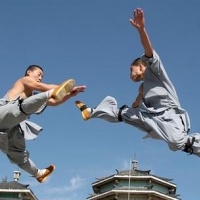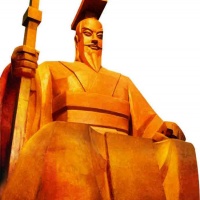- Home Page
- Fact Tours
Our sample tour itineraries of China and China travel packages are sorted by theme and available at competitive prices, you can browse what tours are right for you for your trip to China.
Popular China Tour Packages

Custom Tour Packages to China and Ask Our Experts for Free Enquiry !
- Coach Tours
- Destinations
Beijing, the capital of China. Its art treasures and universities have long made it a center of culture and art in China.
Beijing Top Attractions
Beijing City Tours
Best China Tours with Beijing
Shanghai, the cultural and economic center of East Asia. It renowned for its historical landmarks, the extensive and growing skyline.
Shanghai Top Attractions
Shanghai City Tours
Best China Tours with Shanghai
Xi'an, having held the position under several of the most important dynasties. It is the top destination to explore the facts of Chinese history.
Xi'an Top Attractions
Xi'an City Tours
Best China Tours with Xi'an
Huangshan boasts its culture, beautiful rivers, villages and mountains. It's home to 2 UNESCO World Heritage Sites and the Mecca of photographers.
Huangshan Top Attractions
Huangshan City Tours
Best China Tours with Huangshan
Sichuan is the cradle of the Shu culture, panda, mahjong, teahouse and spicy food. The province ranks first in China by number of UNESCO World Heritage Sites. It is called "the Heaven of Abundance".
Sichuan Top Attractions
Sichuan Tour Packages
Best China Tours with Sichuan
Yunnan, literally means the south of colorful clouds, due to its beautiful landscapes, mild climate and diverse ethnic cultures and traditions, is one of China's major tourist destinations.
Yunnan Top Attractions
Tibet, the nearest land to the sky, is known for its breathtaking landscape, splendid culture, art, buildings, and mysterious religions.
Tibet Top Attractions
Tibet Tour Packages
Best China Tours with Tibet
Explore the lost civilizations by riding a camel! Travel across the Gobi and the desert, and over the high mountains. Our Silk Road tours including different sections of the Silk Road in China.
Silk Road Top Attractions
Silk Road Tour Packages
Best China Tours with Silk Road
Guilin, an internationally-known historical and cultural city, has long been renowned for its unique karst scenery. Its vicinities are the paradise of hiking, caving, rafting, biking and countryside exploring.
Guilin Top Attractions
- China Facts
- China Hotels
- Travel Photos
Culture & Symbol
- China Giant Panda
- The Four Great Inventions of Ancient China
- Chinese Medicine
- Ornamental Pillar
- Traditional Chinese Medicine (TCM)
- Sacred Animals
- China Great Mountains and Rivers
- Chinese Knot
- Carapace-Bone-Scripts
- Buildings
- Chinese Philosophy
- Chinese Name Culture
- Chinese Literature
- Chinese Language
- FUWA Memorabilia
- Chinese Fengshui Theory
- Chinese Cultural Understanding
- Chinese Astrology & Horoscope
Chinese Cultural Understanding
Regardless of the time spent in advance preparation, you are sure to experience a certain amount of cultural shock when entering the People's Republic of China. China is an awesome encounter for all but the most callous travelers. The more flexible and sensitive you can be to the Chinese culture, the more quickly you will be able to adapt.
 Chinese culture is quite unique, not only different from that in western countries, but also from some other oriental countries as Japan, India, Korea, Thailand and Mongolia. In China's long history, Chinese people have set up their own cultural system, including its special square-shaped characters (more than 5000), music instrument and music, painting, philosophy, medicine, architecture, cooking, etc. All of these are all totally different from the Western ones, and also make China culturally attractive and some difficult to be understood by western people. The best way to know a culture is to touch it, to experience it because each culture has its own reason to exist, and it is hard to say which one is the standard. Confucius once said, reading books and traveling are two main ways to obtain knowledge. It would be great since you want to go to China to see it with your own eyes.
Chinese culture is quite unique, not only different from that in western countries, but also from some other oriental countries as Japan, India, Korea, Thailand and Mongolia. In China's long history, Chinese people have set up their own cultural system, including its special square-shaped characters (more than 5000), music instrument and music, painting, philosophy, medicine, architecture, cooking, etc. All of these are all totally different from the Western ones, and also make China culturally attractive and some difficult to be understood by western people. The best way to know a culture is to touch it, to experience it because each culture has its own reason to exist, and it is hard to say which one is the standard. Confucius once said, reading books and traveling are two main ways to obtain knowledge. It would be great since you want to go to China to see it with your own eyes.
Westerners tend to view situations with the Chinese by analyzing the way the Chinese behave, while paying very little attention to their own behavior. The western concept of a service-oriented society contrasts significantly with the Chinese concept of total view as substandard service in hotels and restaurants when, in fact, no offense has been intended. At the same time, some of you may believe that the backwardness evident everywhere in China (even behind the modern facade) can be overcome by applying Western notion of efficiency and organization, and they are often quite vocal in expressing these beliefs. Now forge on and experience the culture. You indeed will have many surprises ahead. A westerner who had been to China over 30 trips concluded his experience as "Expect the Unexpected'', and then enjoy it. Those "Unexpected" experience, actually, is part your purpose to trip China! As a result of his 30 trips to China, the westerner came to love the country and people.
 But focusing only on this interpretation, and not taking into consideration the background and beliefs of the other side, very little in the way of real understanding can be achieved. One must attempt to understand the Chinese system of values in order to gain even a limited appreciation of the country. It is self-defeating and perhaps arrogant to promote the 'Westernization' of a culture that is of thousands-year history. It is not a good way to observe the country with your own view of value, or with a color glass.
But focusing only on this interpretation, and not taking into consideration the background and beliefs of the other side, very little in the way of real understanding can be achieved. One must attempt to understand the Chinese system of values in order to gain even a limited appreciation of the country. It is self-defeating and perhaps arrogant to promote the 'Westernization' of a culture that is of thousands-year history. It is not a good way to observe the country with your own view of value, or with a color glass.
For a tourist who has never had the experience of being a minority, simply being the only Westerner in a sea of Chinese can be upsetting. This does tend to open one's eyes to the fact that one fifth of the world's population does not have daily exposure to Western culture. It is easy to forget, in the relative wealth and luxury of the West, that so many live in very modest circumstances - the average city dweller in China has no more than 40 sq. feet of living space, and even relatively prosperous individuals who seek a vacation retreat usually end up sharing their room with strangers.
Nevertheless, tour members continually report that one of the most positive aspects of their journey to China was experiencing the warmth and friendliness of the Chinese people.
In China, surnames are always given first. A man named as Wang Xin, for instance, should be called as Mr. Wang, instead of Mr. Xin. A married woman always retains her maiden name.
 A friendly greeting somewhat equivalent to "Hello, how are you," is "Ni Hao'' in Chinese, a typical answer to them is a friendly "Ni Hao". The fact that you used Chinese back to them is accepted as very friendly gesture on your part. Chinese children are usually colorfully dressed and are not much different in their action from as your children at home. The Chinese put great stock in politeness and thoughtfulness in foreign-Chinese interactions. They are becoming more used to abrupt, forthright way, but fell slightly uncomfortable with openly emotional behavior. But you will find that most of Chinese tour guides are quite open-mined and easy-going. Of course, not every Chinese is reserved, and we encourage you to be yourself.
A friendly greeting somewhat equivalent to "Hello, how are you," is "Ni Hao'' in Chinese, a typical answer to them is a friendly "Ni Hao". The fact that you used Chinese back to them is accepted as very friendly gesture on your part. Chinese children are usually colorfully dressed and are not much different in their action from as your children at home. The Chinese put great stock in politeness and thoughtfulness in foreign-Chinese interactions. They are becoming more used to abrupt, forthright way, but fell slightly uncomfortable with openly emotional behavior. But you will find that most of Chinese tour guides are quite open-mined and easy-going. Of course, not every Chinese is reserved, and we encourage you to be yourself.
The Chinese people have been characterized as puritanical. This is true to the extent that couples seldom display affection by touching each other in public, although you may meet some young people walking on street hand-in-hand. The Chinese can, however, be remarkably warm and friendly. It is best to let them take the lead in gestures of affection, and males should be cautious about touching Chinese women professionals or guides, even in a friendly way. A handshake is perfectly appropriate and acceptable. A male asking a Chinese female guide if she is a married woman can be often be taken wrong. But you also can talk some personal things with your guides after you get to know each other well.
 In China, tour guide and his/her manager is principally regarded the same. Nobody is thought as a servant, so you have to remember: DON'T TREAT ANY CHINESE PERSON, ESPECIALLY YOUR GUIDE, AS A SERVANT! Tour members frequently make personal requests to their guides, which the guide will try their best to satisfy if he/she. Sometimes the guide will consult with your escort and national guide, and he/she or the national escort will explain to you if they can not satisfy yours. Requests for an activity out of the planned schedule are more effective when given to the escort first. The escort can then determine the appropriateness of the request before presenting it to the guide. Generally there are little flexibility in the schedule. As mentioned above, your Chinese guide may go to great lengths to avoid saying "No" to a request. Chinese people like to answer a question in an indirect way, so you would say "We will consider it'' instead of "No'', when your request is hardly satisfied. As trite as its sounds, a smile is indeed the universal language, and gracious acceptance of an unchangeable situation will be appreciated by your escort and guide. Joining a group, tourists must understand that the schedule usually can not be changed, and the escort and the guide need cooperation from each tourist. Any of your cooperation will be remembered by your escort and guide, as well as other tourists, and be appreciated by them. We do suggest you have the experience, and also wish to listen from you what you see, hear and experience in China. You will have many Chinese friends if you are friendly to them.
In China, tour guide and his/her manager is principally regarded the same. Nobody is thought as a servant, so you have to remember: DON'T TREAT ANY CHINESE PERSON, ESPECIALLY YOUR GUIDE, AS A SERVANT! Tour members frequently make personal requests to their guides, which the guide will try their best to satisfy if he/she. Sometimes the guide will consult with your escort and national guide, and he/she or the national escort will explain to you if they can not satisfy yours. Requests for an activity out of the planned schedule are more effective when given to the escort first. The escort can then determine the appropriateness of the request before presenting it to the guide. Generally there are little flexibility in the schedule. As mentioned above, your Chinese guide may go to great lengths to avoid saying "No" to a request. Chinese people like to answer a question in an indirect way, so you would say "We will consider it'' instead of "No'', when your request is hardly satisfied. As trite as its sounds, a smile is indeed the universal language, and gracious acceptance of an unchangeable situation will be appreciated by your escort and guide. Joining a group, tourists must understand that the schedule usually can not be changed, and the escort and the guide need cooperation from each tourist. Any of your cooperation will be remembered by your escort and guide, as well as other tourists, and be appreciated by them. We do suggest you have the experience, and also wish to listen from you what you see, hear and experience in China. You will have many Chinese friends if you are friendly to them.
Read more Chinese culture info at See China-Global Chinese Culture
Questions & Comments
Home | About Us | Partnerships | Terms & Conditions | Privacy & Security | Payment Guide | Resource Links| Sitemap
Email: contact@chinafacttours.com, Tel: +86-773-3810160, Fax: (+86) 773-3810333
Copyright © 2008-2022 China Fact Tours. All rights reserved
![]()









